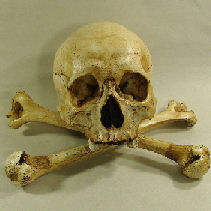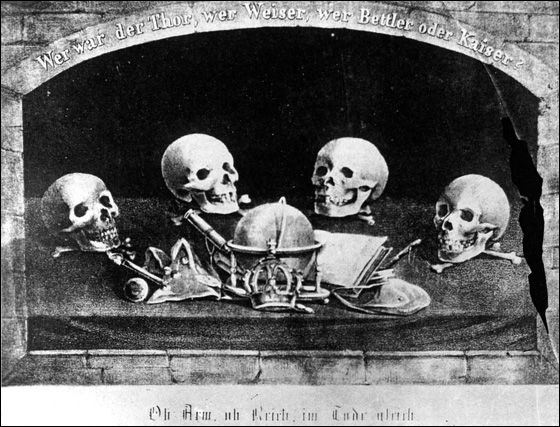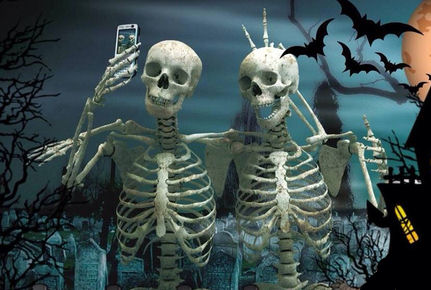
Skull and Bones is a secret society, of some renown, at Yale University. The motto of the society is said to be “Bari Quippe Boni”, Latin for “Nature makes only a few who are good.” To this should be added “Sin aliter tibi videtur, quod unus ex illis non credentibus et” which means “If this is what you believe then you’re obviously not one of them.” Seeing, and thereby validating and extracting, the good in others is a strong indicator of whether or not someone is headed in the right direction, or “good” themselves.
Also alleged to be hanging in the Skull and Bones Tomb is the engraving of a vault below:

“We War Der Thor, Wer Weiser, Wer Bettler Oder Kaiser?” is German for “Who was the fool, who the wise man, beggar or king?” and below the vault is engraved; “Ob Arm, Ob Beich, im Tode gleich,” which means “Whether poor or rich, all’s the same in death.” The engraving was once accompanied by a card, on which was written, “From the German Chapter. Presented by Patriarch D.C. Gilman of D. 50.” (Sutton, op. cit., p. 233)
The original German text is from a longer poem (which predates the Illuminati by 300 years). It’s about how everyone must eventually dance with death. The original meaning of this was that all men are equal; the very opposite of the nonsensical ‘Bari Quippe Boni’ (few are good) motto mentioned above.
Consequently popular modern speculation about the intentions of the Skull and Bones society is that many of them aren’t grasping the original meaning of ‘who is the fool’ and are misinterpreting the words to mean that there is no collective good or afterlife and that selfishness, while the getting is good, is the only smart recourse.
During the initiation ceremony of a bonesman the initiate is said to be asked whether a particular skeleton is that of a king, nobleman, or beggar. Whatever the initiate’s choice the president is then said to declare that “The character of a being a man is the only thing that’s important.”
[The group is believed to be in possession of the stolen remains of Apache leader Geronimo. In the eye sockets of a bonesman, was Geronimo a peasant, nobleman, or king?]
If this “character is important” conclusion is true then there’s hope for bonesmen too and any “might as well be rich and powerful” misapplications are further illuminated by a famous Edgar Cayce quote:
“Few does power not destroy” – Edgar Cayce
Again, in light of this truth; “Who’s the fool?”
“The Character of the man is most important” suggests that some good men are actually likely to be found amongst the “Skull and Bones” group; that some of them, just like most of us, would like to see the entire world thrive and flourish in peace. Who knows, maybe one day there’ll even be a bonesman whistle blower?
The egocentric “Few are Good” motto of the group, however, seriously needs to be revisited by any among them who are objective about the truth. The obvious vast preponderance of good is found outside of this, or any other, group.
One way to be good is to recognize and acknowledge the good in, and amongst, some of these men.

R.I.P.



